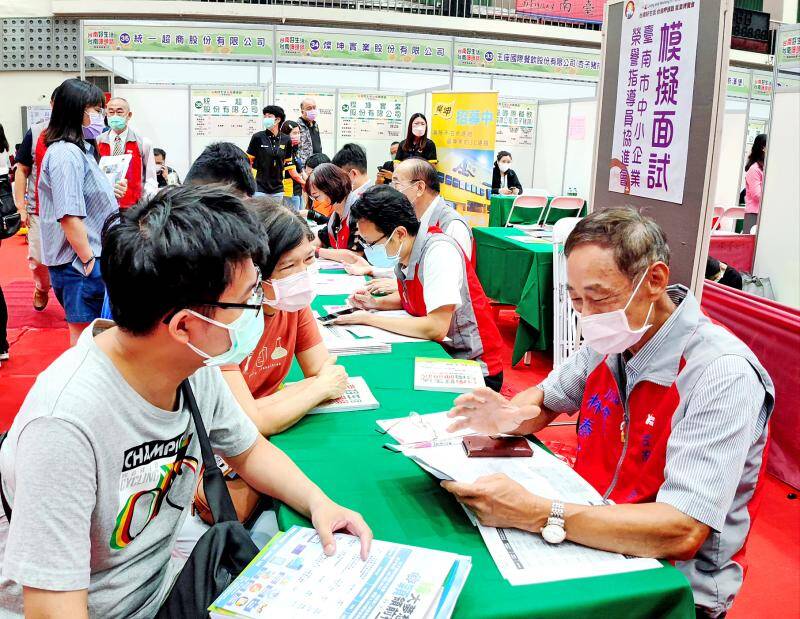Local companies believe that nearly a third of all job opportunities will vanish in 10 years due to the rise of artificial intelligence (AI), according to a survey released by online job bank yes123 on Tuesday.
In the survey of 1,016 companies on the labor market’s third quarter outlook, the job bank focused in part on AI’s impact on workers and asked companies what percentage of jobs they felt would be lost to AI’s round-the-clock productivity and high-speed computing prowess.
Respondents felt on average that 29.2 percent of job opportunities would be lost to AI over the next 10 years, but there were no suggestions on what would replace those jobs.

Photo: Wu Chun-feng, Taipei Times
The job bank also asked companies to identify the labor- intensive and knowledge-intensive fields of endeavor in which people were most likely to lose their jobs to AI.
Among labor-intensive disciplines, the most likely job to vanish according to companies was ticket selling, cited by 54.3 percent of respondents.
It was followed by call center agents (53.6 percent), assembly line workers (52.2 percent), gas station attendants (35.7 percent), and wholesale and convenience store clerks (34.8 percent).
The top five vulnerable knowledge-intensive jobs, meanwhile, were translators (37.2 percent), journalists (36.3 percent), bank clerks (35.2 percent), financial traders (29.1 percent), and insurance agents (28.2 percent).
In addition, a total of 49.8 percent of companies indicated that they are considering adopting automation or AI, a significant increase from last year’s survey result of 42 percent, yes123 said.
Among them, 19.6 percent reported that related AI projects are already in progress, with expectations that employees possessing relevant skills will have an average starting salary at least 31.6 percent higher than others.
Bingo Yang (楊宗斌), a spokesman for yes123, said the job market was heading toward “human-machine collaboration,” or workers directly supported by AI to achieve task objectives.
That way, AI can handle tasks that require high precision and repetition, allowing workers to engage in more creative work, Yang said.
The online survey, conducted June 7-20, had a confidence level of 95 percent and a margin of error of ± 3.07 percent, according to yes123.

In Italy’s storied gold-making hubs, jewelers are reworking their designs to trim gold content as they race to blunt the effect of record prices and appeal to shoppers watching their budgets. Gold prices hit a record high on Thursday, surging near US$5,600 an ounce, more than double a year ago as geopolitical concerns and jitters over trade pushed investors toward the safe-haven asset. The rally is putting undue pressure on small artisans as they face mounting demands from customers, including international brands, to produce cheaper items, from signature pieces to wedding rings, according to interviews with four independent jewelers in Italy’s main

Macronix International Co (旺宏), the world’s biggest NOR flash memory supplier, yesterday said it would spend NT$22 billion (US$699.1 million) on capacity expansion this year to increase its production of mid-to-low-density memory chips as the world’s major memorychip suppliers are phasing out the market. The company said its planned capital expenditures are about 11 times higher than the NT$1.8 billion it spent on new facilities and equipment last year. A majority of this year’s outlay would be allocated to step up capacity of multi-level cell (MLC) NAND flash memory chips, which are used in embedded multimedia cards (eMMC), a managed

Japanese Prime Minister Sanae Takaichi has talked up the benefits of a weaker yen in a campaign speech, adopting a tone at odds with her finance ministry, which has refused to rule out any options to counter excessive foreign exchange volatility. Takaichi later softened her stance, saying she did not have a preference for the yen’s direction. “People say the weak yen is bad right now, but for export industries, it’s a major opportunity,” Takaichi said on Saturday at a rally for Liberal Democratic Party candidate Daishiro Yamagiwa in Kanagawa Prefecture ahead of a snap election on Sunday. “Whether it’s selling food or

In the wake of strong global demand for AI applications, Taiwan’s export-oriented economy accelerated with the composite index of economic indicators flashing the first “red” light in December for one year, indicating the economy is in booming mode, the National Development Council (NDC) said yesterday. Moreover, the index of leading indicators, which gauges the potential state of the economy over the next six months, also moved higher in December amid growing optimism over the outlook, the NDC said. In December, the index of economic indicators rose one point from a month earlier to 38, at the lower end of the “red” light.